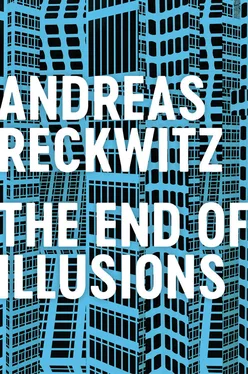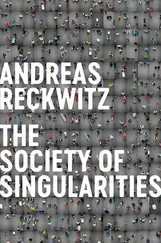The essentially liberal narrative of progress over the last 30 years is supported by an abundance of empirical evidence, and this should not be forgotten. Regarding political progress, one can point to the pro-democracy movements in Eastern Europe, Latin America, and Africa, which led to the replacement of authoritarian regimes by largely liberal-democratic systems. In addition, global cooperation between nations also intensified, and the European Union is just one example of this. There is plenty of evidence, too, of economic progress. Globalization and the integration of large parts of the global South into the world market have accelerated industrialization, especially in emerging countries such as China and India, and this has led to a significant reduction of poverty and to the rise of a strong middle class. In North America and Europe, a post-industrial knowledge economy has been established, and the latter has profited considerably from the digital revolution.
The process of digitalization – the defining technological development of the last two decades – at first seemed to fit seamlessly into this narrative of progress. A network of individuals and organizations, the internet as an experimental space for new identities and cooperation, and finally a borderless form of communication that vitalizes democracy – such were the expectations of tech euphoria. Lastly, the narrative of progress also has a socio-political component. Consider the great gains that have been made in liberalization and emancipation over the last few decades: a shift toward gender equality, toward the equal rights of sexual minorities (gay men, lesbian women, and the transgender community, for instance), and toward a transformation of the Western way of life, which has become more hedonistic and cosmopolitan in the best sense and thus left behind so much of the rigidity of postwar society. In particular, the new and young middle class moves around in the globalized world like a fish in water. A sense that the world is fundamentally open has been spreading over the past few decades, and by now this seems like a firmly established attitude toward life.
Of course, these developments have happened , and they are significant. The liberal narrative of progress is not false. It does not, however, tell the whole truth. Whoever believes that the idea of progress can ever correspond perfectly to social reality is prey to an illusion. Moreover, it is also an illusion that processes, once set in motion, will somehow naturally be perpetuated. The financial crisis, Brexit, terrorist attacks, Trump’s election, and other events of the recent past illustrate that social reality is more contradictory and fragile than the narrative of progress would have us believe. Furthermore, it should be assumed that these events are ultimately expressions of or reactions to contradictions, conflicts, and moments of crisis that have long been developing on the structural level of late-modern society.
Progress, Dystopia, Nostalgia
The fact that, until recently, the liberal narrative of progress was able to seem so ubiquitous is not especially unusual if we broaden our perspective and consider the cultural history of modernity as a whole. Over the course of industrialization, democratization, urbanization, marketization, emancipation, and the rise of science, modern society has been developing slowly but steadily since the eighteenth century (and at first in Western nations), and it has always been inextricably linked to a vision of making progress: to the “project of modernity.” As Reinhart Koselleck observed, the rise of the semantics of progress coincided with the reality of (political, economic, and technological) revolutions at the end of the eighteenth century; the semantics of progress accompanied these revolutions and, in part, actively impelled them. 3In a sense, modernity converted the religious belief in the assurance of salvation into a firm belief in progress.
Of course, throughout the history of modernity in the nineteenth and twentieth centuries, there were often heated debates over what, exactly, this realized or desired progress ought to be about: technology, freedom, equality, welfare and comfort, self-determination, or emancipation? In addition, there have always been alternating phases of progressive optimism and cultural-critical self-doubt. In nineteenth-century Europe, the Napoleonic Wars were followed by a long phase of bourgeois self-confidence and the unwavering hope for civilizational progress (accompanied, not coincidentally, by imperialism and colonialism). At the beginning of the twentieth century, the baton of progressive optimism was passed on to burgeoning socialist movements. The First World War was then followed by a phase of gnawing intellectual uncertainty and widespread skepticism, which gave rise, among certain thinkers, to an outright catastrophic outlook concerning the downfall of European modernity. In this regard, it is enough to read Oswald Spengler’s The Decline of the West or José Ortega y Gasset’s The Revolt of the Masses . 4After the civilizational upheaval of fascism, the Holocaust, and the Second World War, liberal progressive optimism resurfaced astonishingly quickly in Western Europe and North America. What followed was the trente glorieuses (as Jean Fourastié called these three decades), which were characterized by the rise of affluent societies in the West and by visions of creating a perfect form of industrial-technical modernity. In the 1970s, these societies were confronted with economic and ecological debates over the “limits to growth” and with the discomforting social critique in the wake of 1968. Then the communist system collapsed, the final and most radical thrust toward globalization commenced, and the digital revolution began, thus initiating a renewed phase of the liberal narrative of progress in an era of presumably unlimited opportunity. Today, this narrative is stridently being called into question.
It is instructive to keep in mind these previous upsurges of the social discourse of progress. A historical perspective relativizes many things – both the blind faith that people sometimes have in the conflict-free progress of human development, and the defeatist and catastrophic attitude that inevitably follows. Our current situation, at any rate, is characterized by the genre of dystopia . 5For many people, the sense of disappointment over the failure of the liberal ideal of progress is so great that now, driven by strong emotions such as rage or despair, they tend to fall into the opposite extreme. If public discourse were a psychiatric patient, we would have to say that it displays symptoms of manic depression: boundless euphoria is immediately followed by feelings of profound hopelessness (which, in many people, seem to be accompanied by a quiet sense of pleasure about the impending disaster).
The current dystopias point in different directions. Enormously present in the media – particularly in the digital world, but also in the popular book market – are the diagnoses of downfall from members of the New Right. They have ultimately revived the cyclical philosophy of history found in Spengler’s The Decline of the West . In contrast, one hears entirely different opinions from left-wing critics who, in the wake of the financial crisis, have been gathering evidence for the imminent implosion of capitalism – a collapse that many of these authors themselves, owing to the lack of a socialist alternative, can only imagine as a hopeless ongoing crisis. On top of this, the public discourse about digitalization has meanwhile almost fully transformed from one of tech euphoria into a sweeping critique of technology. The latter discourse now prefers to associate the digital revolution with the all-encompassing control of users by business-related or government data collectors, with filter bubbles and caustic communication, and finally with automation and the threat of mass unemployment.
Читать дальше









